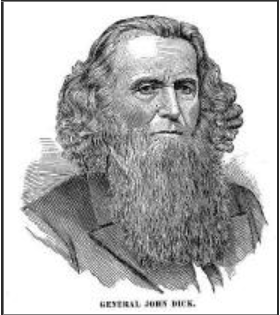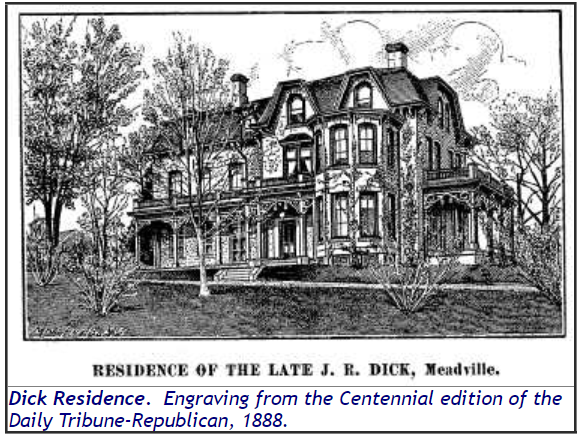Dick, Honorable John

deceased, who was of Scotch-Irish descent, was born in Pittsburgh, Penn., June 17, 1794, son of
William and Anna (McGunnegie) Dick, and the eldest of four brothers who attained mature age, viz.:
John, David, James R. and Wilson W., all now deceased. He was brought to Meadville by his parents in
the year of his birth, when the place was but a hamlet of log-houses. He was married, November 16,
1830, to Jane A., eldest daughter of Samuel Torbett, Esq., one of the pioneers of Crawford County,
and many years largely interested in real estate business. To this union were born six children:
George M., entered as cadet at West Point in 1850, assigned to duty in Texas in Col. Robert E. Lee’s regiment,
and died in 1856; J. Henry, died at the age of eighteen; Samuel Bernard; Anna C., married to D. C. Shryock; Mary E.,
married to Edward S. Sayer, and John. Gen. John Dick died May 29, 1872, in the seventy-eighth year of his age, leaving
behind him the inestimable heritage of a good name, and when the grave closed over him it shut out forever from human sight,
but not from loving memory nor from the affection of the heart, a man who had in his lifetime seen the creation in this
section of telegraphs, railroads, canals, schools, commerce and other evidences of advanced civilization, with the
inevitable and consequent regression of the red man toward the setting sun, and the extinction of their title under
the provisions of Wayne’s Treaty; it shut out forever from all earthly view one whose every action in life pronounced
him to be by nature a gentleman—an honest man—tender-hearted as a child, influenced even to a fault by the warmth of his
own feelings, ever ready to protect the weak against, the strong, and to cover the faults of a friend with the mantle of charity.
In a word, as a sincerely good man, he was possessed of many strong and admirable points of character. Physically he was of a noble and
commanding presence. To the last his will was strong, his heart warm and radiant, emotional as though kindred by the fires of youth,
while his clear blue eyes beamed in harmony with the kindly, sympathetic tones of his rich voice. In his household he was a worthy example
in all its duties as a sincere Christian, a devoted husband and an affectionate father. The disease which carried him off was in the form of a violent cold, which settled on his lungs and baffled the best medical treatment.
Hon. John Dick was for many years a successful merchant in Meadville, and was one of the founders of the private banking house of J. R. Dick & Co.,
which, in 1850, was known as J. & J. R. Dick. In 1840 he was a member of the Electoral College which cast the vote of Pennsylvania for Gen. Harrison.
In 1850 Gov. Johnson appointed him Associate Judge of Crawford County, and following year he was elected and commissioned to the same place. It was
while filling this position he was first elected to Congress, from the district composed of the counties of Erie and Crawford, in 1852, continuing
to represent it for three consecutive terms. The military titles conferred on Gen. Dick commenced early in life, and ran through a rapid and
uninterrupted promotion. At the age of twenty-seven he was elected Major of the First Battalion, and was so commissioned by Gov. Hiester in 1821.
In 1825 he was made Colonel of the Thirty-first Regiment; in 1831 he was commissioned by Gov. Wolf Brigadier-General of the Second Brigade, Sixteenth Division,
composed of the counties of Beaver, Butler, Mercer, Crawford, Erie, Venango and Warren, extending from the banks of the Ohio to the shores of Lake Erie.
In all matters of improvement for the general good he was an earnest co-worker and a generous contributor. The Eastern Plank Road was constructed mainly
through his instrumentality, and to him is Meadville, as well as surrounding country, indebted in a large measure for the Atlantic &Great Western Railroad.
He was one of the Trustees of Allegheny College, President of Crawford Mutual Insurance Company for several years; at one time Captain of the Cussewago Fire Company,
the earliest organization in the fire department in this city, over forty years ago, and at the time of his death he was the oldest vestryman of Christ Church,
Protestant Episcopal, Meadville, having been elected to that position February 7, 1829, and for more than forty years he devoted his best energies to the welfare of the parish.

The mother of Hon. John Dick, whose maiden name was McGunnegle, was born at Carlisle in 1767, and, as already stated, came to this place with her first husband, William Dick, in 1794. Travelling at a period when this section of the country was mostly a wilderness, she went from Pittsburgh to Franklin, Penn., in a keel-boat, and traveled from Franklin to Meadville through a remarkably deep snow, on horseback, in the month of December, carrying in her arms her infant child—the future Hon. John Dick. William Dick died in 1810, and in 1817 she inter-married with Hon. Jesse Moore, formerly of Chester County, Penn., but at that time and up to his decease President Judge of this Judicial District, by whose death, in 1824, she again became a widow. She died in Meadville, March 5, 1848. She was a most exemplary, pious, Christian lady, for many years a consistent member of the Protestant Episcopal Church of Meadville.
Col. Samuel Bernard Dick, banker, Meadville, third son of Hon. John and Jane A. (Torbett) Dick, was born in Meadville, October 26, 1835, and received all the advantages of the best private schools and colleges at home, but left college to enter into business before he took his degree. He was engaged with his father and uncle in the banking business at the breaking-out of the war of the Rebellion, and he at once tendered his services to Gov. Curtin, and was commissioned Captain of the Meadville Volunteers, the first company of troops organized in Crawford County. The company went into camp at Pittsburgh, and on the organization of the far-famed Pennsylvania Reserve Corps, in May, joined that organization, and his company became known as Company F, Ninth Regiment Pennsylvania Reserve Corps. Immediately following the first battle of Bull Run, the regiment and division were ordered to Washington, and sworn into the service of the United States for three years’ service, and became the right wing of the Army of the Potomac. On the 20th of December, 1861, at Dranesville, Va., Capt. Dick was severely wounded while leading Gen. Ord’s advance in that engagement. He returned home, but on the opening of the spring of 1862, although he had not entirely recovered from his wound, he rejoined his company, and participated with them in all the battles of the Army of the Potomac, under Gen. McClellan, commanding his regiment at South Mountain and Antietam. For gallant and meritorious action, while commanding his regiment, he was recommended by Gens. Mead, Reynolds, and Hooker for promotion to the rank of a Brigadier-General, but continued ill health resulting from exposure and wounds, compelled his return home on sick leave, where he remained until the first of March, 1863, when, under the advice of the surgeon in charge, he was reluctantly compelled to resign his commission.
When Gen. Lee’s army moved northward into Pennsylvania in the summer of 1863, Gov. Curtin telegraphed Capt. Dick to come immediately to Harrisburg, and requested him to take charge of the organization and mustering into service of all the State troops west of the Allegheny Mountains, and at the urgent request of the Secretary of War took command of the Fifth Regiment Pennsylvania Militia, and proceeded to New Creek, Va., where he assumed command of all the forces at that point, relieving Gen. Kelly. At the expiration of this service, he returned to private life, and resumed the banking business in Meadville, in which he is still engaged, and is now the head of the firm of J. R. Dick & Co., which had been organized in 1850. In 1864 Col. Dick was elected a member of the Electoral College of Pennsylvania which cast the vote of the State for Lincoln’s re-election.
Col. Dick has been very prominent in the Masonic fraternity since 1857, having served through all the minor grades in Lodge, Chapter and Commandery up to 1878, when he was elected the Grand Commander of Knights Templar in Pennsylvania, and in 1880 was elected Grand Master of Masons in Pennsylvania, being the highest distinction in the power of the fraternity to bestow. Col. Dick is the only person ever chosen to be Grand Master of Masons west of the Allegheny Mountains, and the only Mason in Pennsylvania who ever held the office of Grand Commander and Grand Master.
In 1863 Col. Dick married Miss Agnes Scott, of Pittsburgh, Penn., daughter of Thomas Scott, for many years President of the Merchants’ and Manufacturers’ Bank of that city, and to this union were born two children: John Henry and Harriet A. In 1878 he was elected by the Republicans of his district to represent them in Congress serving one term. He was Mayor of Meadville in 1870, and under his administration the City Market was erected. He is Director and Treasurer of the Meadville Gas Company, Meadville Water Company and Phoenix Iron Works; Director of the Meadville Glass Works, and Treasurer of Crawford Mutual Insurance Company; has been a Trustee of Allegheny College for many years, and President of the Board of Trade since its organization. The Colonel is a member of the Protestant Episcopal Church, and has been for many years a vestryman in Christ Church, Meadville. Of a genial and warm-hearted temperament, courteous and charitable by nature, Col. S. B. Dick has made himself hosts of friends, who invoke for him many years yet of usefulness, honor and happiness.
David, second son of William and Anna (McGunnegle) Dick, and brother of Hon. John Dick, was born March 1, 1797, the second white child to see the light of day in Meadville, which was his home during his long and busy life. He was an enterprising, popular and liberal man, an intelligent and much respected citizen. He died in 1870 of erysipelas. David Dick was the originator of the anti-friction press, and the "Allegheny," the first steamboat to ascend the Allegheny River, was the product of his energy. He was a member of the Protestant Episcopal Church. He was married to Lydia C. Calhoun, of Carlisle, Penn. James R. Dick, the third son of William and Anna Dick, was born in Meadville, April 22, 1801. In 1816 he moved temporarily to Pittsburgh, Penn., where he remained five years. He then returned to Meadville and went into business with his brother David. From 1835 to 1840 he, for a second time, became engaged in business in Pittsburgh, in partnership with the late Col. David C. Stockton. About 1845 he resumed business in Meadville, in company with his brother, Gen. John, and subsequently, in 1856, established himself in the banking business, in which he remained until within a few days of his death, which occurred February 9, 1875, at which time he was Senior Warden of the Protestant Episcopal Church. He was married to Harriet, daughter of John Kelty Smith, of New Orleans, La., by whom he had one son—Jesse Moore—born in Meadville, July 22, 1833, married in 1861 to Louisa Thorp, of New York City, and died February 2, 1874, without issue. For his second wife James R. married Miss Harriet S. Thorp, of Fairfield County, Conn., and to this union were born Anna M., widow of Lieut. Corn. John McFarland; Harriet S., wife of George S. Cullum; Sturges T., married to Adelaide King, daughter of Charles A. King, Esq., of Toledo, Ohio; Elizabeth W., wife of Col. J. Ford Dorrance. Wilson W., the youngest son of William and Anna Dick, was born in Meadville, July 17, 1803, and soon after attaining his majority, chose law as his profession. He was admitted to the bar of Crawford County in 1829, and immediately began to practice, but not finding the pursuit of Blackstone congenial, he soon abandoned it and assisted his brothers in merchandising. In 1832 he married Miss Elizabeth Betts. In 1840 he was elected Justice of the Peace, serving one term. From 1848 to 1850 he was engaged in the coal business at Greenville, and from 1856 to 1865 was similarly interested at Georgetown. With the exception of these two intervals and the time spent in the study of law at Pittsburgh, Penn., Mr. Dick was a continuous resident of Meadville. He was a devoted Christian man, a member of and for fifty-five years a faithful and exemplary communicant of the Episcopal Church. He died July 31, 1882.
History of Crawford County, Pennsylvania: containing a history of the county, its townships, towns, villages, schools,
churches, industries, etc., portraits of early settlers and prominent men, biographies, history of Pennsylvania, statistical and miscellaneous matter, Chicago: Warner, Beers & Co., 1885, page 728-731.


